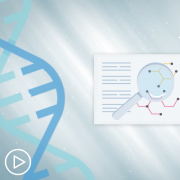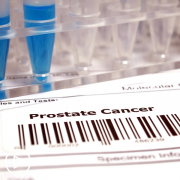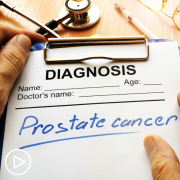Ask the Prostate Cancer Expert: How Is Prostate Cancer Diagnosis and Treatment Evolving? from Patient Empowerment Network on Vimeo.
What should prostate cancer patients, care partners, and underserved patients know about? Watch as expert Dr. Yaw Nyame from the University of Washington shares insight about prostate cancer detection, screening guidelines, specific concerns for Black men, support groups, and clinical trials to work toward better health outcomes for all.
See More From Best Prostate Cancer Care No Matter Where You Live
Related Resources:
Transcript:
Sherea Cary:
Hello, we are here with Dr. Nyame. I have a few questions for you. Dr. Nyame, how has prostate cancer evolved over the last decade regarding the onset of the disease, the population in which it impacts the care and the treatment?
Dr. Nyame:
You know, prostate cancer is the most common cancer in men that is in a solid organ. It affects about one in nine men over their lifetime, and probably the biggest advance or change we’ve seen in the disease occurred in the late ‘80s with the introduction of the PSA test. What that allows us to do is detect cancers very early in their natural life history, if you will, and that gives us the opportunity really to provide treatment when there’s…with an opportunity for cure. The downside to that is not all prostate cancers are the same, we know that some prostate cancers are diseases that men will die with and not from…meaning that some of these cancers that we detect don’t need any treatment or intervention. This means that a lot of research that has occurred in the last decade or two has been focused on helping us determine which cancers deserve treatment and which ones we can watch safely and so some of the biggest advances have been diagnostic tests such as radiology imaging, so we’ve seen things like MRI really come into the mainstay of prostate cancer diagnosis and treatment upfront. We have very exciting nuclear medicine scans.
So, you might hear the term PSM-A as a new test that’s really going to disrupt and change the way the prostate cancer diagnosis and treatment is made. We also have genetic testing that we can do on blood samples, urine samples, and tissue, that might give us some very exciting information about one’s risk of dying from prostate cancer, which ultimately is what we want to know when we’re offering treatment to someone.
Sherea Cary:
Thank you. What screening test or risk-reducing care would you suggest for men who have a family history of prostate cancer, and at what age should screening begin for specific populations?
Dr. Nyame:
Unfortunately, there is no data, rigorous data to help answer this question, but we know that men that have a high risk of developing prostate cancer benefit from earlier testing with PSA. We know this from a variety of studies, including some modeling studies, which we have done here at the Fred Hutch Cancer Center at the University of Washington. When I talk about high-risk groups, it really falls into two categories, men who have a strong family history and a strong family history means a first-degree relative, father, brother, grandfather that has prostate cancer.
But when we look at the genetics of prostate cancer it’s not just about prostate cancer itself, what we have found is that things that lead to family histories of breast cancer, ovarian cancer, colon cancer also increase your risk of prostate cancer, for instance, the BRCA gene, which is a breast cancer gene is associated with a marked increased risk of prostate cancer. So, knowing your family history matters and knowing it beyond prostate cancer is important. The other high-risk group as men of African descent or ancestry, we know our black men have a much higher risk of developing prostate cancer in their lifetime, it’s about a one in six or one in seven risk compared to one in nine in the general population. So, the recommendation I make for these two groups is to consider screening earlier and to do it more frequently. On average, PSA screening happens for men between the ages of 55 and 70 or 74, and it’s usually every two years, if you look at the population level data, I would suggest that you consider screening at age 45 or 40 and doing it every year, however, you’ve got to turn the screening off at some point. So, if your PSA stays low and is non-concerning into your early 70s, then I think you can be reassured that your risk of having a fatal or aggressive cancer is low, and you could safely stop screening.
Sherea Cary:
Thank you. So, for someone who has a first degree relative such as a father who had prostate cancer and maybe even an aggressive form of prostate cancer, it will be important for them to get screened at 40 to start at least having a baseline number to be able to watch it?
Dr. Nyame:
Absolutely. The baseline number is really a topic of discussion in the urologic community because we know that if you get a PSA at age 40 and its above one or above the median for your age group, that you’re a lifetime risk of having what we call significant cancer, so that’s a cancer that might have the potential to be fatal in your lifetime is higher, and so theoretically, you could get that one-time PSA at 40 and use that as a basis for how intense your screening practice would be. I’ve talked about PSA testing, but screening also involves the digital rectal exam, and it’s important that men understand that both those things together is what leads to a thorough and good clinical evaluation, when it comes to prostate cancer risk.
Sherea Cary:
Thank you so much for sharing the information about the BRCA gene as well. I’ve heard information about the BRCA gene, but I always hear it in relation to women, I’ve never heard it in relation to a connection with prostate cancer.
That is very interesting to know. What does a multi-discipline approach to prostate cancer look like?
Dr. Nyame:
Well, when you think about prostate cancer and how it’s diagnosed and how it’s treated, you’re talking about a process that involves a team, the process often starts with your primary care physician, he or she may order a PSA test, which will prompt a biopsy if it’s positive, so that’s the step one is that relationship you have with your primary care physician. Step two is going to be your urologist, that’s the person that’s going to do your biopsy, and if you are diagnosed with prostate cancer that person in conjunction with your primary care physician is then going to be leading this process of, do we actively watch your cancer because it’s a low risk, or do we seek treatment because it’s localized, meaning it’s in the prostate and we can still get your treatment with curative intent as we call it, or has it spread? And in that case, your options for a doctor is different on the watch side, you’re probably looking at a urologist who’s watching closely, on the localized side, you’re going to talk to maybe a radiation specialist or a urologist because both treatments are equal and their effectiveness from cancer treatment.
But they have different side effects. And I think to get good information about what treatment is best for you, you should see both, and then on the advanced side, you’re talking about medical oncologist that’s going to help navigate all of the various treatments that we have now for stage IV prostate cancer, and even in that setting, you might still find yourself considering a clinical trial with someone like a urologist or getting radiation treatment, which can be standard of care in select patients that have stage IV cancer. So as you can see, it is a very wide range of individuals that are helping take care of your cancer, and that’s just on the treatment side, that’s not talking about any of the other supportive services that you may need that may exist either in your community or in your health systems where you’re getting treated, and those can include patient navigators, social workers, the various nursing services, nutritionists, there’s a lot of people that you may want to put on your team as you’re considering your care.
Sherea Cary:
Thank you. So, some people may consider prostate cancer a couples’ disease. What advice would you give to a care partner? My father was a prostate cancer survivor, my mother was very supportive of him, but I took much of the lead as far as being his caregiver and coordinating things between my father, his doctor’s appointments, and with my siblings.
Do you believe that support people, caregivers, such as children, are able to also assist in receiving care?
Dr. Nyame:
Absolutely. The data is overwhelming in this scenario, patients who are partnered or have strong social support do better, and I always say that the patients who have the best outcomes when it comes to cancer, have someone like you, Sherea in their life. It’s not surprising, given the burden of cancer treatment, that having someone that can help navigate all the aspects of your care and be there to support you leads to better outcomes and better satisfaction with the treatments that you choose, a cancer diagnosis, especially prostate cancer diagnosis, a disease that has a very high cure rate, has a very long lifespan, but has really life-altering potential consequences of the treatments you received, has an impact on what we return your survivorship. So how do you live with your cancer, and so the individuals that are there to support you through that journey are absolutely critical.
Sherea Cary:
Thank you. What differences do you see in terms of aggressiveness for cancers in different… Various populations?
Dr. Nyame:
This is an area of research that for me, is trying to understand why certain populations have more aggressive or worse outcomes when it comes to prostate cancer.
The most obvious example of this here in the United States is for black men. Black men are more likely to be diagnosed with prostate cancer each year, so about 70% more likely to be diagnosed and they are twice as likely to die from prostate cancer as men of other races in the United States. If you look at what the natural history of prostate cancer and Black men looks like, meaning if you were to chart from diagnosis through the course of the disease, does it look different for black men? The answer is yes,, it appears of Black men get prostate cancer when they’re younger, and there’s data to suggest that perhaps Black men get more aggressive prostate cancer because they’re more likely to progress from the localized or treatable disease to stage IV aggressive disease that can’t be treated. We don’t understand what the drivers of that are for a long time, the medical community has suggested that it’s all biology, and by that may be an inherited biology, but we know that health disparities really carry a significant social contribution, and in fact, I like to say that social and environmental factors inform biology too, and so if we see something biologic that explains these trends, it doesn’t mean that that’s the way they were born, it might mean that you put someone in a community that lives near a highway with high pollution or does not have access to clean water or lives in a state of high stress or over security, we don’t know what the biologic manifestations of those types of experiences are, but that perhaps is the reason why we see our communities of color, especially our Black men, experiencing a higher burden of prostate cancer.
Sherea Cary:
So, is there a push to have African-American men tested earlier with the PSA test, since it appears that they may get prostate cancer earlier?
Dr. Nyame:
The U.S. Preventative Services Task Force, which makes a recommendation to the medical community about prostate cancer screening states that they cannot make a specific recommendation about screening in black men and other high-risk populations like men with a strong family history of prostate cancer, because those men were not included in the clinical trials that have looked at the efficacy of PSA testing for screening.
Unfortunately, black men make up 3 percent or less of participants in the two screening trials that have informed whether there’s a benefit to PSA testing, which there has been shown to be a 20 percent decrease in dying from prostate cancer if you get screened. We recently took data from the screening trials and superimposed them on real-world data from our surveillance apparatus for cancer in the United States, and what we found was that if you did lower the age of screening in Black men from age 55 to 45, that you did decrease the risk of dying from prostate cancer significantly. It is our hope that this type of research will encourage the U.S. Preventative Services Task Force and other medical societies to reconsider their screening recommendation for black men, ultimately, whatever, if there is a recommendation made to screen at younger ages, I think we need to be conscientious and evaluate what the impact is on the ground, so that if there is a time where we need to reverse a recommendation like that because it’s potentially harmful, that we consider that, but I feel strongly sitting here today that we do need to advocate for earlier screening and Black men.
Sherea Cary:
What advice do you have for prostate cancer patients about locating a clinical trial. Where can you find one?
Dr. Nyame:
Clinical trials tend to happen at the big cancer centers and the big academic university centers, although many of those programs will have affiliate partners out in the community. The easiest way to learn about clinical trials is to start by asking the physician that’s treating you for your prostate cancer, oftentimes, they’ll have resources and connections to the trials directly or are the people who are administering them; however, other great sources are going to be patient advocacy networks, and there are many of them for prostate cancer, there’s one… There are several, I’ll start naming a few. They have the Prostate Cancer Foundation, you have Us TOO, you have zero cancer, you have a PHEN, Prostate Health Education Network, which is an advocacy group for black men with prostate cancer. So these are all great sources of finding out what clinical trials exist, and in addition, you can just get on the Internet and Google if that’s something you have access to, the trick is navigating all the information, and I think knowing what trials are available for you, whether you qualify, that kind of thing can be difficult, and that’s ultimately where finding a provider, whether it’s your direct urologists or radiation oncologist or whoever is helping treat your prostate cancer, either them directly or sometimes seeking a second opinion, and going to a place where you might find someone who has some expertise in trials, if that’s something that you’re interested in.
Sherea Cary:
My father participated in a clinical trial, it was going on, I think the time of his treatment, and it was offered to us, and he was at a big facility here in Houston that offered…ask him if he wanted to participate. We did a lot of research. We said we’d try it. And we were glad to be able to participate. I participated in clinical trials also for different health conditions, ’cause I believe it’s important that we have to participate in order for our people to gather the information that’s necessary. So thank you for that.
Dr. Nyame:
Absolutely, you know I think there are a lot of reasons that we think that our black community, for instance, may not participate in a clinical trial given the history of medical experimentation and various forms of abuse that have existed in our history, but what I recently heard from our partner of our community partners at PHEN, when they surveyed black men about prosecutor clinical trials, was that although there was some concern about trust in the history, that the overwhelming majority of the men wanted to participate, but they never were asked, and that’s really stuck with me, and I think that black men are under-represented in clinical trials, and we have to find ways to be more inclusive and understand what barriers might exist into participation so that we can have that data to care better for the population.
Sherea Cary:
Thank you so much for spending time with us today. I appreciate you sharing your knowledge.
















